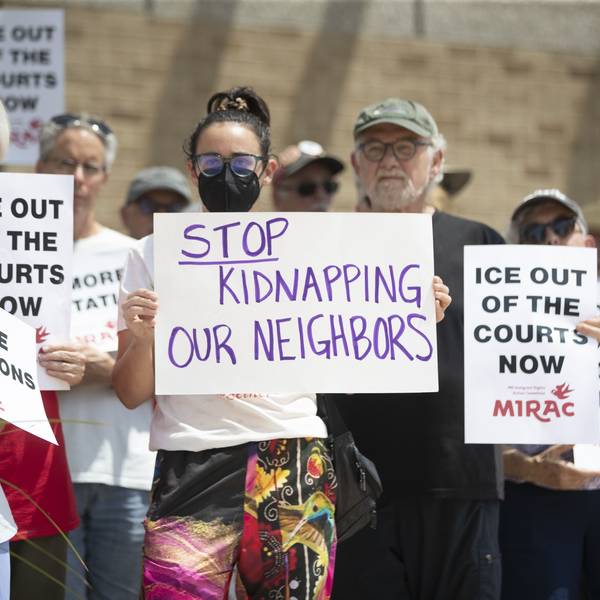Condemning Republican legislators in Arkansas for attempting to withhold "life-saving care" from vulnerable young people, the ACLU filed a legal challenge in federal court late Tuesday to block the state's ban on gender-affirming healthcare for transgender youths.
The law will cause "catastrophic harm" to young people in the state if it goes into effect on July 28 as planned, James Esseks, director of the group's LGBT & HIV Project, said.
"In a year that has seen many horrific attacks on transgender people, among the cruelest and most dangerous is Arkansas' new law that bans gender-affirming care for trans youth," wrote Esseks in a blog post announcing the ACLU's request that a federal judge strike down the law.
The ACLU is representing four families and two doctors with young transgender patients in the lawsuit challenging H.B.1570, which was passed in March. Under the law, doctors are prohibited from providing medically necessary, gender-affirming healthcare, or even referring patients to places where they can obtain care.
"Trans young people should not have to fight so hard to live. Even with supportive families, these bills have devastating consequences."
--Chase Strangio, ACLU
Private insurance companies would be able to refuse coverage for gender-affirming care for people of all ages and state funds would be barred from use for gender-affirming care for people under age 18. Doctors could lose their licenses for disobeying the law by providing young transgender people with puberty blockers, hormonal therapies, or other gender-confirmation treatments.
"This law would be devastating to trans youth and their families, forcing many to uproot their lives and leave the state to access the gender-affirming care they need," said Holly Dickson, executive director of the ACLU of Arkansas. "Gender-affirming care is life-saving care for our clients, and they're terrified of what will happen if this law is allowed to take effect. No child should be cut off from the medical care they need or denied their fundamental right to be themselves--but this law would do both. We're suing to stop this cruel and unconstitutional law from taking effect and inflicting further harm on these children and their families."
Esseks and Dickson highlighted the experience of Brooke Dennis, a nine-year-old girl who is transgender and "is fearful about what will happen to her if she cannot get gender-affirming medical care when puberty begins."
"Our child has known exactly who she is since she was two years old," said Brooke's mother, Amanda Dennis. "She was a happy child and felt comfortable expressing herself but when she began to feel pressure at school to pretend she is a boy, she began to really struggle. It was painful to watch our child in distress. Last year, when she told us she is a girl and would like to be called 'Brooke' and referred to using she and her pronouns, we supported her immediately and the cloud of sadness lifted and her smile came back."
"This law stands in the way of our child getting the medical care she will desperately need," she added.
Republican Gov. Asa Hutchinson vetoed the first-in-the-nation medical care ban in April, saying it would override "parents, patients, and healthcare experts," but the GOP-led state legislature overrode his veto.
The American Academy of Pediatrics said in March that the bill and other anti-trans legislation are discriminatory and are "based on myths and misinformation about transgender children and adolescents and a misunderstanding about medical and surgical aspects of gender-affirmative care."
The group cited studies showing that of 1.8% of high school students who are transgender, 35% say they have attempted suicide, and that the risk of suicide decreases by 70% for young people who receive medical treatment aligning with their gender.
The ACLU plans to launch more challenges to dozens of other anti-trans measures moving through state governments across the country, in which Republicans are attacking transgender students' ability to use public restrooms and participate in team sports in accordance with their gender identity, trying to prevent cities from expanding discrimination protections to include transgender people, and limiting access to healthcare.
"These attacks against trans youth in Arkansas and in states around the country will not go unchallenged--not while they are debated in legislatures, not after they pass, not when they are discussed in public conversation," said Chase Strangio, deputy director for transgender justice with the ACLU's LGBTQ & HIV Project. "The ACLU and our partners will be filing several lawsuits over the course of the next few months to make it clear that there is a robust movement of trans people and allies fighting for trans justice. Trans young people should not have to fight so hard to live. Even with supportive families, these bills have devastating consequences."
"Our work will not be done until every law that targets transgender people is struck down as unconstitutional and all transgender people are able to live without fearing discrimination and violence because of who we are," Strangio added.




